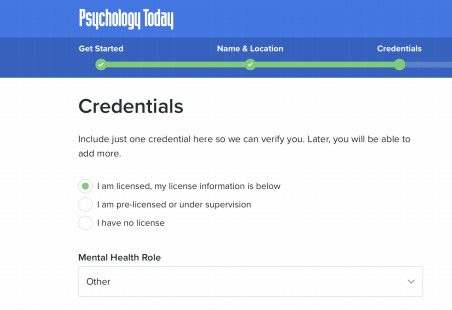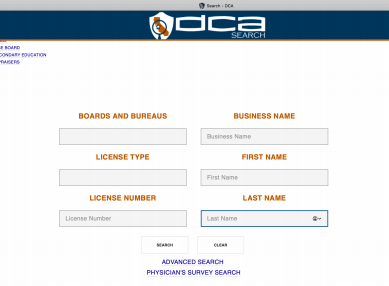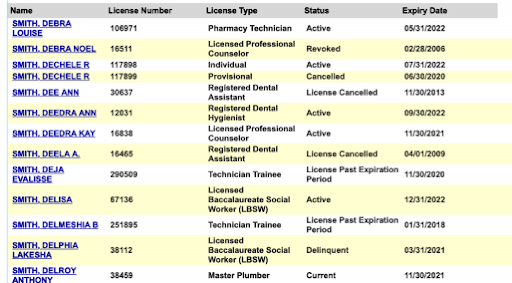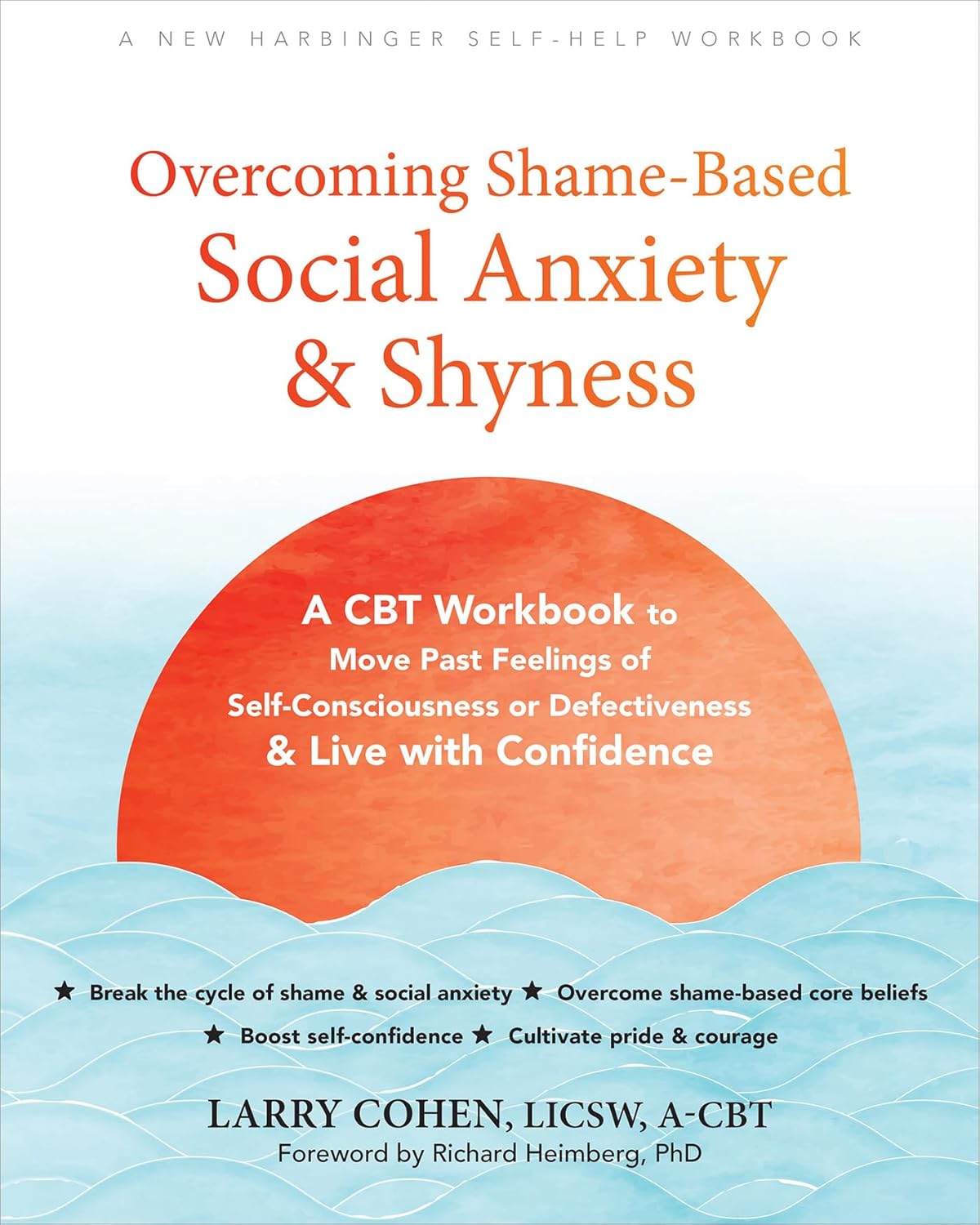Maybe you have been suffering with anxiety for a while and you have finally decided to get help. Or maybe your family physician has suggested that you look for a therapist. Or perhaps your child’s school is recommending that you find a therapist for your child. Or maybe you are one of the many Americans who has been struggling to manage your anxiety for a long time but you haven’t had much success in therapy in the past. But whatever the reason, if you are trying to find a well-trained therapist to help you with anxiety, this article is for you. It is intended to help guide consumers to some of the resources available to objectively evaluate their prospective therapist.
Since the early days of my practice, I have tried to make sure that I provide as much help as I can to every person who calls me—whether they intend to become a client or not. Prospective patients find me online and often call to ask questions, such as, do I accept insurance? How much do my sessions cost? What is interesting is that after I provide answers to those basic questions, one of the most common questions I have heard from consumers is, “How do I know if a therapist is a good one or not?”.
As it happens, this is a topic in which I have a great personal interest. You see, I’m not only a provider of therapy, I’m also a business owner who hires therapists for my practice! Early on, I definitely made some mistakes but I have also hired a number of very well-trained therapists over the years. So, some of what I’m going to share with you are the results from experiences I have had trying to find the best trained therapists to join my practice.
My hope is that with a little guidance, consumers can avoid some of the common pitfalls and at least narrow down the field to identify therapists with the basic education and training to address their mental health needs.
What should I be looking for in a therapist?
If you want to find a therapist with the best training to treat any anxiety disorder and/or Obsessive Compulsive Disorder (OCD) (which sometimes co-occurs with other anxiety disorders) you will need to do a bit of legwork. As you begin your search, you might be considering whether you prefer a male or a female therapist. Or perhaps you are thinking about whether you would want to work with someone who is older than you or closer to your age. These are personal preferences—and while these factors may help guide your decision making somewhat, a more important therapist attribute to look for is what is referred to in the trade as Clinical Orientation, also known as Theoretical Orientation.
The importance of clinical orientation
Clinical / Theoretical Orientation is the term used to describe the theories which frame the ideas, interventions and techniques that the therapist uses to help clients change. Some clinical orientations focus a lot of attention on a client’s behaviors. Others emphasize the role of the client’s childhood experiences. Each clinical orientation has its own ideas about how to help people with mental health problems.
Thankfully, you don’t need to know all of the clinical orientations in order to find a well trained social anxiety therapist. Because if you are seeking treatment for social anxiety— or any anxiety disorder for that matter— the Clinical Orientation you should be looking for is called Cognitive Behavior Therapy, also known as CBT.
So, the first attribute of a well-trained therapist for anxiety is that they are a CBT therapist. And while that is a good start, it’s important that you know a bit more because it’s a little more complicated than that. One of the specific treatments that some CBT therapists offer is called Exposure and Response Prevention. Exposure and Response Prevention, also known as ERP, is considered the gold standard for the treatment of Anxiety Disorders. Incidentally, ERP is also the best treatment for Obsessive Compulsive Disorder (OCD), which as I mentioned, sometimes co-occurs with the other anxiety disorders. And while all therapists who provide ERP are, by definition, CBT therapists, not all therapists who do CBT are skilled in ERP.
Another CBT treatment for Anxiety Disorders that has gained significant traction in recent years is called Acceptance and Commitment Therapy, or ACT. While ACT does not yet have the extensive body of research to support its efficacy, it is definitely proving to be a helpful adjunct to ERP.
So to sum up, the first basic qualification to look for when trying to find a well-trained anxiety therapist is to find a CBT therapist. But specifically, you would want to look for a therapist who is trained to provide Exposure and Response Prevention, or ERP, and possibly also trained in Acceptance and Commitment Therapy, or ACT.
OK, so where do I find a CBT therapist who provides ERP?
Almost everyone who is looking for a therapist these days searches online. Even people who are given a specific therapist’s name will take a peek at them online. The internet can be a wonderful resource, but consumers have to be cautious when they surf the web using the basic search engines. Most basic search engines are not going to protect you from disreputable individuals or companies. So if you decide to do a basic internet search for psychotherapists in your area, you will have no way of knowing if the results you are getting are legitimate or not. It is for this reason that many consumers are turning to more specialized online directories. Probably the most popular online directory for therapists is Psychology Today.
Psychology Today’s online directory
If you do any online search for therapists in your area, you are likely to see numerous results from Psychology Today come up high on your search list. Psychology Today can be a wonderful tool to find therapists in your area that meet certain criteria. And they do make an effort to verify the identity of the individuals who are advertising on their site. However, Psychology Today is VERY clear that their verification process is limited and they encourage consumers to do their own homework:
“We strongly encourage users to make their own investigation of third-party sites before proceeding with any transaction with such third parties.”
(Taken from Psychology Today’s “Terms of Use”)
Furthermore, consumers must know that Psychology Today allows individuals without a license to advertise! Consumers might be surprised to hear this, but please see the screenshot below, taken directly from the Psychology Today sign up process:

If you are a patient who is looking for a CBT therapist who is skilled in using ERP to treat your anxiety, you absolutely should be looking for a therapist who is either licensed or pre-licensed, but you should avoid therapists who are un-licensed. And unfortunately, Psychology Today does not inform consumers whether or not a particular individual is un-licensed. So if you search on Psychology Today for therapists in your zip code, your results will include both licensed and unlicensed individuals— without any clear indication of who is who!
Therefore, when you use Psychology Today, you will need a bit of background if you want to find a licensed therapist. The first step is going to be to gain a basic understanding of the acronyms you will see after the therapist’s name.
Understanding acronyms
LPCC, LCSW, CiPP, LP, BC-DMT, PPSC…the alphabet soup of acronyms can be daunting to navigate! I must admit that I myself am often confused by some of the acronyms! However, if you know what to look for, and more importantly, what to ignore, you will be able to weed through prospective therapists like a pro!
Educational Acronyms:
The most common educational acronyms you will see are the following:
- MA- This indicates a Master of Arts degree.
- MS- This indicates a Master of Science degree.
- MSW-This indicates a Master of Social Work degree.
- PhD- This indicates a Doctor of Philosophy degree.
- PsyD- This indicates a Doctor of Psychology degree.
The most important thing to know about the educational acronyms above is that none of them—and I do mean NONE—have any bearing or relevance as to whether or not the individual holds ANY license to practice psychology or to provide therapy. This is a tough concept for individuals to understand! Particularly when an individual refers to themselves as “Dr. Smith”…its hard to believe that the “Dr.” title does not mean anything about whether the individual is AT ALL licensed to provide psychotherapy!
But it’s true! None of the titles you see above will help you to figure out which are the licensed therapists. So then let’s move on to the most common acronyms that DO, in fact, help us to identify licensed versus unlicensed therapists:
- MFT or LMFT- Licensed Marriage and Family Therapist
- LICSW or LCSW- Licensed Independent Social Worker and Licensed Clinical Social Worker
- Psychologist- Licensed Psychologist
- LPC or LPCC- Licensed Professional Counselor
While there are admittedly more acronyms in use that indicate licensure, the acronyms above are BY FAR the ones you will encounter the most. So if you see one of the above acronyms, you can know that, at the very least, the individual is claiming to be a licensed therapist.
There are also some acronyms that are commonly used by individuals who are training to become licensed. Below are some of the more common acronyms and titles used for pre licensed individuals:
- APCC- Associate Professional Clinical Counselors
- LMHCA- Licensed Mental Health Counselor Associate MFTi- Marriage and Family Therapy Intern
- ACSW, LSWAIC, or LSWAA- Social Work Intern
- Psychological Assistant/Registered Psychologist- Doctoral level pre-licensed therapist
Please know that just because these individuals are not yet licensed does not mean that they are not good therapists! There is a big difference between individuals who are un-licensed and individuals who are pre-licensed. There are many superb pre-licensed therapists out there and often times they offer discounted services or have more availability than do the licensed therapists. Although, just as with licensed therapists you will be able to verify your pre-licensed therapists’s training status on their licensing board. And it is important for consumers to take a few additional steps to ensure that the pre-licensed therapist they choose has a supervisor monitoring their progress.
Most pre-licensed therapists are required to let you know, in writing, that they are in training. This is typically done with an informational sheet given to you at the start of therapy. It describes the training status of the therapist and provides the name of their supervisor. If you do decide to work with a pre-licensed therapist and you have doubts about your treatment, you may want to contact their supervisor to ensure that they are indeed receiving adequate supervision. But even if you have confidence in the skills of your pre-licensed therapist, you should always make sure you have the name of their supervisor. Then, you should make sure that the supervisor is a licensed therapist who is in good standing with their board.
While Psychology Today does some basic verification of the license status of the therapist in their directories, they make it clear that the information is limited,
“When you see the “Verified By” seal, it means we have made good faith, reasonable efforts to verify the following and have found no contrary information:
i) The name and contact details provided by the professional.
ii) That the professional’s license, if applicable, is valid within the state in which he or she practices.
iii) That the professional is not subject to any license strictures preventing practice.”
We verify the information at the time a professional is initially listed in our directory and then upon expiration of the professional’s credentials.”
(Taken from Psychology Today’s “Terms of Use”)
Additionally, whether licensed or pre-licensed, it is important that you verify that the therapist you choose is in good standing with their licensing board. Even pre-licensed therapists are tracked and monitored by state regulatory boards. So the next important step to take will be to ensure that your therapist (whether licensed or pre-licensed ) is in good standing.
Verification of licensure
Before you consider going to any therapist, you absolutely should look them up on the appropriate regulatory board to ensure that they are indeed licensed and in good standing. Every state and territory in the US has at least one, if not more, agencies that regulate the practice of psychology and the provision of psychotherapy. And every state and territory has a consumer protection office that helps consumers verify professional licenses. The following is a website that will help you find the consumer protection office in your state:
https://www.usa.gov/state-consumer
As long as you have the full name of the therapist you are considering, you can typically verify their license on your state’s consumer protection office website. The only difficulty might be that if your therapist has a very common name, you might find several listings that are difficult to tell apart. Sometimes you can use the therapist’s street address to differentiate the therapist you are trying to verify.
Here in the state of California, we are able to verify professional licenses at the Department of Consumer Affairs: https://search.dca.ca.gov/.
If you click on that link, you’ll see something that looks like this:

Once you enter in the first and last name of your therapist, you will see something that looks like this:

What you are seeing above is the information you will find if you search for my name! Some of this information is confusing, so let me show you what you are seeing. The three entrees with my name reflect each of the times I applied to the board to practice psychology during the three different phases of my training. If you notice, there are two entires which show the license type, “cancelled”. Please be assured, there is nothing nefarious here! The “cancelled” license status is completely normal and simply indicates that once I completed that phase of my training, I canceled that license. The more important entry is the one in the middle:

This is what an active psychologist’s license looks like in the state of California. Because there are so many different labels that are used within different specialties in psychotherapy, my suggestion is that you focus on whichever entry has language which suggests that it is “current.” In California, we call it “Renewed & Current” but other states use other terminology such as “Active” or “Clear” to indicate a valid license.
If your therapist has no entry that is designated as “Renewed & Current” or “Active,” well, then…there might be a problem. At times, there are paperwork snafus that result in problems that might have no bearing on the legitimacy of your therapist. However, as a consumer, if you are unable to find your therapist’s license online, it benefits you to ask more questions, either to your therapist or to their licensing board. And if indeed you do find an entry that says, “Suspended,” “Revoked” or something similar…well, then once again, you might want to consider another therapist.
Each state uses slightly different terminology and so you will need to familiarize yourself with the language used by your state to indicate the status of the licensee. Below is an example of what Florida’s license search looks like:

Here’s what a license search looks like in Texas:

If at any time you are confused about the licensure status of your therapist or if you discover that your therapist has been disciplined by their licensing board, you might consider getting additional information by contacting your state’s licensing board. Please know that it is your right as a consumer to have access to this information!
If you are unable to find your therapist through your state’s consumer protection office, you might have to ask your therapist for help. It is perfectly acceptable for a patient to ask their prospective therapist for their licensing information. Have you heard the old adage, “the man who has nothing to hide, hides nothing”? A therapist’s license is public information. If the therapist you are considering is cagey or seems evasive about providing you with the information you need to verify their license, then you might want to consider looking elsewhere.
The good news is that the vast majority of therapists have a clean and unencumbered license. Relatively few therapists have licenses that have been suspended or revoked. While it is important for the public to be aware of the status of their therapist’s license, even more important is that prospective patients are aware of whether their therapists are even licensed to provide psychotherapy at all!
It is becoming increasingly common for unlicensed persons to use terms like “Life Coach” or Professional Mentor” (among many others) to attempt to provide talk therapy to patients with mental health problems. And we are seeing a growing trend in which unlicensed therapists are advertising their services right alongside the licensed ones. They use confusing acronyms and tricky titles to convince consumers that they hold some special or unique certification that makes them a good choice. But make no mistake— these unlicensed therapists have not met any specific criteria to practice. They do not have any requirements for formal or informal training and as such, there is absolutely no way to know what level of background or training they have received.
One of the many benefits of obtaining treatment from a licensed therapist is that, if you believe you are improperly treated, you will be able to contact their licensing board to report your experience. Unlicensed therapists are not regulated by any agency and as such, if you choose to receive treatment from an unlicensed therapist, it will be difficult, if not impossible, to hold them accountable.
Psychology Today makes a “good faith, reasonable effort” to verify licensure information, but they do not independently verify the claims made by the therapists in their directory. As such, it is important for consumers to take the extra step of reviewing a prospective therapist’s license on their local consumer protection office website.
So now you have verified that the therapist you are considering has a valid and unencumbered license in you state. But the next important step to take is a tricky one. How can you verify that your therapist is actually trained to treat your anxiety disorder? If you recall, I told you early in this article that you should be looking for a Cognitive Behavior Therapist (CBT) therapist who is proficient in Exposure and Response Prevention (ERP). Well, Psychology Today apparently has recognized that consumers want to know this information. As such, they offer therapists dozens of check boxes to indicate their clinical orientation and their specialty. But there is a big problem with this system. Psychology Today does not make any effort whatsoever to verify that the therapists claims are valid! So the result is that ANY therapist can say that they specialize in working with patients with anxiety disorders—even if they don’t!
I really wish that I could tell you that therapists are always accurate about their experience and limitations. But the truth is that they are not. And how do I know this? I mentioned early in this article that not only am I a provider, I am also a business owner who hires therapists. Specifically, I hire therapists who are proficient in the use of Cognitive Behavior Therapy (otherwise known as CBT), which as I mentioned is really what you should be looking for in an anxiety therapist. I cannot tell you how often I have interviewed therapists who claim to be proficient in CBT or in ERP who don’t know the first thing about CBT! I hate to disparage these therapists, because I’m not sure that they even realize that they are engaging in this duplicity. More often than not, these therapists just do not understand CBT well enough to know that they aren’t actually doing it.
So what is a consumer to do? One strategy I’m hearing from some patients is that they have tried using online reviews. So let’s turn to that…
Online reviews
Some prospective patients are so desperate for objective information that they turn to online reviews. I wish I could be more optimistic about this prospect, but unfortunately, there are several problems with online reviews that make them a less than ideal source of information.
First, as I’m sure many have heard, the Harvard Business Journal famously reported their estimate that upwards of 20% of the reviews on Yelp are fake. Now, you might be thinking….Seriously? Would therapists seriously fake their reviews? The short answer is, yes—But it’s complicated. Therapists who are desperate to bring in business might not actually pretend to be a satisfied patient and write a review for themselves. But they might do other things.
A few years ago, a colleague of mine included me on a group communication. She asked that if her friends and colleagues wouldn’t mind, could they support her by describing their experiences with her on Yelp. She went on to provide some specific guidance, asking that they just reflect on any skills they had noticed during interactions with her.
Now I must say that this was a somewhat sticky situation for me. This woman is a licensed psychologist, just as I am. And as such, I had some concerns about whether or not this was a legal or ethical way to go about drumming up business. We had a conversation about it and ultimately she decided to abandon her efforts to solicit reviews from her peers and instead worked to build up her online presence in other ways. But the moral of the story is that therapists, just like other professionals, do indeed fall into the trap of using less than genuine reviews to pad their online presence.
What is important for prospective patients to know is that the presence of fake reviews is just one of several reasons why they probably are not well-served by reliance on online reviews. Even if we remove that issue, there is another extremely important factor to keep in mind. And that is that if they are seeing online reviews, it is likely to reflect a very small minority of the therapist’s patients. That is because, unlike restaurants or barber shops, many types of therapists are actually prohibited from soliciting testimonials and reviews! And even if they aren’t strictly prohibited, they are often highly discouraged from asking patients to review their services. One example of this is from my own professional standing as a licensed psychologist. Code 5.05 of the Ethical Principles of Psychologists and Code of Conduct states that,
“Psychologists do not solicit testimonials from current therapy clients/patients or other persons who because of their particular circumstances are vulnerable to undue influence.”
Even without any rule or code, I believe that it is very important for therapists to be extremely cautious about the use or solicitation of online reviews from either current or former patients. Therapists become close with their patients and often learn about them in a way that few others in their lives ever will. The therapy relationship hinges on trust and we as therapists must treat that relationship with care and caution. While I know that some therapists do, in fact, ask former patients for testimonials, I personally would never want to risk diminishing the therapy relationship by attempting to use it for advertising.
Additionally, I would not want any patient, even a previous patient, to feel the need to write an online review for me. I believe that in so doing, they might put their own privacy at risk. My patient’s privacy is far more important to me than advertising my practice. I am not alone in these thoughts. In fact, therapist’s desire to protect their patients and distance themselves from the practice of online reviews has resulted in the growing use of “electronic communications policies” as part of the standard intake packet. These policies actually discourage clients from any sort of electronic communication—from sending emails to writing online reviews (whether positive or negative).
The bottom line here is that, if you search online for information about your therapist and you are unable to find any reviews, it would be a mistake to conclude that the lack of reviews reflected anything about your therapists’ skill or training. If anything, a lack of reviews might simply reflect the therapists’ strict adherence to their ethical guidelines.
So then, where can consumers look to find a well-trained Cognitive Behavior Therapist who is proficient in the use of the best treatments for anxiety disorders, which are Exposure and Response Prevention (ERP) and/or Acceptance and Commitment Therapy (ACT)?
Thankfully, there are several organizations that have stepped in to fill this gap.
The National Social Anxiety Center
https://nationalsocialanxietycenter.com/
It would be remiss if I did not first acknowledge the sponsors of this blog, the National Social Anxiety Center, also known as NSAC. NSAC is, as they so aptly describe on their website, “Dedicated to providing & fostering effective evidence-based services for those struggling with social anxiety.” Since its inception, one of NSAC’s primary objectives has been to educate the public. And as you can see by this article, NSAC members seek to achieve this objective by providing information about the diagnosis, prognosis and the appropriate treatments for Social Anxiety and other related disorders.
While NSAC and its members aim to disseminate information to the public, they serve another critical function; NSAC seeks to identify clinics who follow the evidence-based protocols that have been proven effective in social anxiety research. NSAC currently has 22 Regional Clinics all across the United States. Each new clinic has been carefully vetted by the NSAC Board of Directors. They only offer membership to clinics who can demonstrate a commitment to evidence based treatments for Social Anxiety Disorder.
I have now been on both sides of the Regional Clinic process (as both a prospective member and a board member) I can tell you that NSAC will not offer regional clinic status to anyone who is not proficient in Cognitive Behavior Therapy as well as Exposure and Response Prevention (ERP) and Acceptance and Commitment Therapy (ACT). The following link will direct you to NSAC’s directory of its 22+ regional clinics: https://nationalsocialanxietycenter.com/regional-clinics/
If you don’t have a regional clinic close by, there are a number of other organizations you can turn to in order to find well trained CBT therapists.
Academy of Cognitive and Behavioral Therapies (also known as “The Academy”)
The Academy of Cognitive & Behavioral Therapies is, “a global community of mental health professionals dedicated to upholding excellence in the dissemination, implementation, and practice of cognitive behavior therapies.” The Academy is an international organization that objectively evaluates clinical skill and awards certification to only those with an advanced level of expertise. I happen to be a Diplomate of the Academy and I can say that certification is not an easy process! The Academy has over 1000 members all over the world and their high standards make them an excellent place to find well-trained clinicians.
The Academy has a “Find a Therapist” feature that I have found to be an extremely helpful resource. On numerous occasions I have had to use this feature myself when one of my patients relocates. I have had tremendous success in finding well trained anxiety therapists. Being a member of the Academy, I can say that the vast majority of our members appear to be extremely well-versed in the treatment of anxiety disorders.
The American Board of Professional Psychology
The American Board of Professional Psychology offers Board Certification in Behavioral & Cognitive Psychology. Rumor has it that ABPP’s certification process is the most rigorous and challenging of all of the programs offered. I can’t speak to this personally because I have not experienced it myself…but I intend to give it a try at some point!
Beck Institute for Cognitive Behavior Therapy
The Beck Institute is a newer certification program, but its long history as an industry leader in training CBT Therapists indicates that they most certainly apply very high standards to certification.
Making Contact
No matter how much legwork you do, you ultimately will need to contact the therapist you choose to make sure that they are a good fit for your needs. Some therapists offer free phone consultations—others don’t. So if you can’t talk to the therapist you’ve chosen by phone, you might end up having to schedule a session with them to figure out if they are right for you.
When you do have an opportunity to speak with the therapist, it is still very important that you verify that they are indeed a therapist with the training and experience to treat your anxiety. Once you have satisfied yourself that your therapist meets the basic license requirements and you feel confident that they at least appear to be a CBT therapist, you might want to prepare yourself with a few “interview” questions for the first meeting or conversation. These are some of the questions that I ask when I am interviewing therapists for my practice.
- Do you assign homework?
- Do you measure progress? And if so, how?
- Do you think it will be important to discuss a patient’s childhood?
Now, let me give you the answers you should be looking for so that you can see how your prospective therapist scores on our quiz.
#1 Do you assign homework?
Best Answer: YES
CBT therapists assign homework. It is a fundamental part of the treatment. And almost without exception, treatment for anxiety disorders involves regular homework. In fact, both Exposure and Response Prevention as well as Acceptance and Commitment Therapy require that the therapist assign homework almost every session.
#2. Do you measure progress? And if so, how?
Best Answer: YES
CBT Therapists generally find some way to measure progress. Even if it’s not a formal symptom measure, it can be an agreed upon target or goal, such as “number of panic attacks per week”. But almost without exception, therapists who are proficient using ERP or ACT will tell you that they use something to measure the patient’s progress.
#3 Do you think it will be important to discuss my childhood?
Best Answer: NO
This is actually a trick question! The answer is no, but even the best trained CBT therapists will find it tricky to respond to. And that is because most good therapists will be too sensitive to give you a hard “No.” They will want to make sure that they aren’t ignoring something important that the patient wants to discuss.
But truth be told, treatment for anxiety disorders will primarily focus on the present. Patients with most types of anxiety disorders have fear and avoidance that occur in the present. Those patterns are the focus of our treatment. In fact, in ERP, the E refers to “Exposure”…meaning Exposure to the feared stimulus. And RP stands for “Response Prevention” meaning that the patient does nothing to avoid, escape or reduce the anxiety and distress that comes with exposure. So as you can hear, a good ERP therapist will likely spend most of the time focused on the present. However, as I mentioned, a well trained anxiety therapist might actually hedge their response and not give you a hard “No.” If you listen carefully, you will usually hear a soft version of “No” from well trained CBT/ERP therapists.
Finding a Therapist who is a Good Enough Fit
At the end of the day, you won’t really know if the therapist is a good fit for you until you spend some time with them. I typically recommend that patients give therapists at least 3 sessions before they make a decision. And that’s because it takes time to develop a relationship. While you can expect that therapists will have an easier time than others at building a relationship and helping you feel safe and connected, at the end of the day, establishing comfort in any relationship takes time.
However, you must remember that when seeking a therapist to treat your anxiety, you are not looking for a friend. And while it’s nice if you like your therapist, its not necessary for you to adore your therapist. As long as you have some basic rapport with your therapist, they should be able to treat you for your anxiety disorder. And that is because successful outcomes in ERP therapy are more tied to the therapist’s skill and their understanding of the treatment principles. So if you focus on finding a skilled therapist, you will be more likely to find success in your treatment.
Written by,
Katy Manetta, PhD
NSAC – Long Beach, CA











